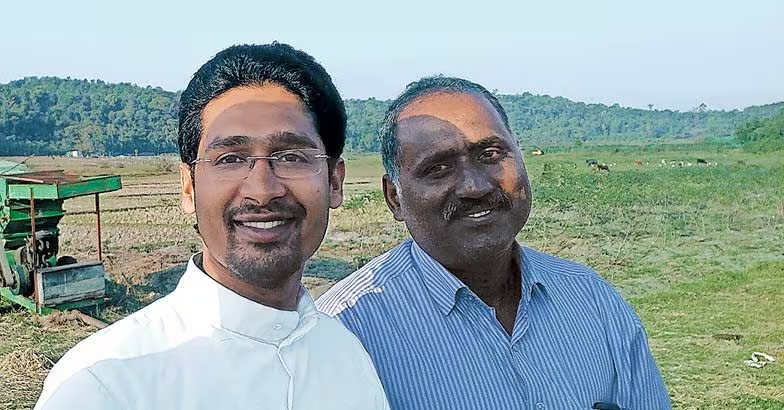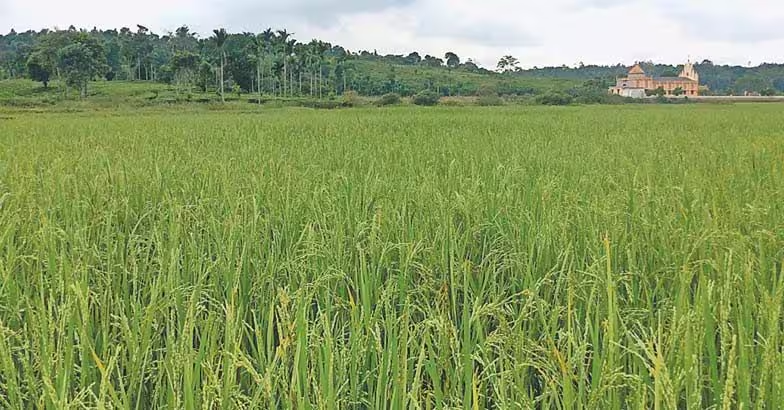Nestled between Kumily and Kattappana, the picturesque village of Anakkara sprawls like a serene plateau. This border village, rich in crops such as cardamom, tea, black pepper, cocoa, and vegetables, has long witnessed the ebb and flow of agricultural prosperity. Once a thriving hub of paddy cultivation, the region’s fields fell into disuse as farmers abandoned rice farming due to economic and logistical challenges. Amidst this decline, promises of airport projects and tourism development brought fleeting hope, but these dreams were eventually shattered, leaving the fields barren and marred by sand mining.
Amidst this backdrop of neglect and ecological damage, the Tiruvalla Archdiocese of the Syro-Malankara Catholic Church stepped in through its Idukki Malankarajyothi Integral Development Society (IMIDS) to restore the region’s agricultural heritage. Over the past three years, IMIDS has successfully cultivated paddy on nine acres of land owned by the Archdiocese, demonstrating a sustainable approach to reviving the region’s farming culture.
A Vision for Sustainable Agriculture
IMIDS’ efforts in Anakkara have transformed 36 acres of farmland into a vibrant model of integrated agriculture. The farm is not just a patchwork of fields but a well-thought-out ecosystem where rice, tea, cardamom, pepper, coffee, tapioca, and other crops thrive. A dairy farm with over 50 cattle, including 13 native cows, complements the cultivation, producing organic manure that enriches the soil. Additionally, the farm boasts three fishponds cultivating species like carp, natter, and ornamental fish, alongside rearing goats and pigs.
The farm operates on organic principles, with every aspect tailored to ensure ecological harmony. Native paddy varieties like Pal Thoni, known for their rich flavour and nutritional value, are cultivated using innovative techniques. During fallow months, native cattle graze the fields, enriching the soil with their manure. This natural fertilisation is further enhanced with fish amino solutions and other bio-fertilisers.
Challenges and Innovations in Rice Farming
Reviving paddy cultivation in Anakkara has been an uphill battle. The cost of preparing the land is prohibitively high, limiting the area under cultivation. In the first year, IMIDS began with just five acres. Over time, with determination and resourcefulness, they expanded to nine acres, producing high-quality rice.
Labour shortages and unexpected weather patterns add to the challenges. Labourers, predominantly women from Tamil Nadu, are brought in for harvesting, significantly increasing costs. Rainfall during the harvest season further complicates operations, often delaying mechanisation efforts. Despite these hurdles, IMIDS managed to harvest six tons of rice in the last season.
To overcome the challenges of marketing, the harvested rice is processed into Pal Thoni organic rice, a brand that stands out for its unpolished, chemical-free quality. Packaged in quantities of one, three, and five kilograms, the rice is sold at ₹110 per kilogram. The branding effort has gained traction, with steady demand from the Archdiocese’s institutions and beyond.
Building a Self-Sustaining Model
While IMIDS has managed to break even in rice cultivation, the future remains uncertain. Rising production costs and limited mechanisation threaten the economic viability of paddy farming. IMIDS is exploring ways to reduce labour costs through mechanisation, but the fragmented small-scale fields of Idukki pose logistical challenges. The team hopes for support from the agricultural department to access the necessary machinery.
IMIDS’ Manager, Fr. John Padipurakkal, and his team are determined to make Anakkara a beacon of integrated farming. Their efforts to preserve and promote the endangered Pal Thoni rice variety are a testament to their commitment to sustainable agriculture. The rice’s long stalks make it ideal for dairy farming, providing quality fodder for cattle.
A Glimmer of Hope for the Future
IMIDS’ efforts are a reminder of the resilience and resourcefulness of the Syro-Malankara Catholic Church’s community initiatives. By combining ecological sensitivity with innovative farming practices, the Diocese has not only revived a once-abandoned agricultural landscape but also provided a model for sustainable development.
As the fields of Anakkara sway once again with the golden stalks of Pal Thoni rice, the Church’s commitment to ecological stewardship shines brightly. The Diocese’s vision of combining faith, ecology, and innovation promises a hopeful future for Anakkara and other regions facing similar challenges. With continued community support and collaboration with local authorities, the legacy of these fields will endure for generations to come.



